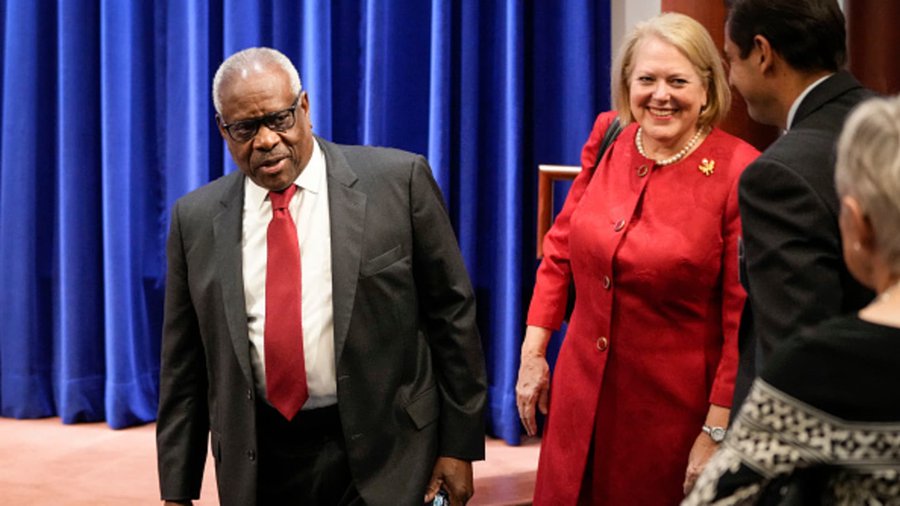Judge Clarence Thomas’ Wife’s Scandal Shows Importance of Impartiality
The Supreme Court is meant to be an impartial arbiter on our country’s constitutional issues. Its judges are expected to be neutral, appointed for life to ensure they don’t think about anything beyond the legal matter at hand. Yet, if a judge feels that they can’t accurately represent the people, they can recuse themselves from the case to maintain the impartiality of the court. Recusal is what Justice Clarence Thomas must do following the discovery of texts sent by his wife, Virginia Thomas, regarding the Jan. 6 insurrection.
Mrs. Thomas urged Donald Trump not to concede via messages to former advisor Mark Meadows. She called Joe Biden’s election “the greatest heist in our history” and told Meadows to “save us from the left taking America down.” These messages cross the line from Mrs. Thomas’s involvement in political activism and active involvement in the proceedings. Mrs. Thomas even admitted earlier this year that she attended Donald Trump’s Stop the Steal rally on Jan. 6, 2021, that provoked the siege on the U.S. Capitol.
If Justice Thomas participates in any more of the court cases regarding the 2020 election, he will set a dangerous standard that calls the impartiality of the court into question.
Justices are subject to a federal law (28 U.S.C section 455) that requires them to recuse themselves from any court proceedings in which their impartiality might be questioned. Justice Thomas and Mrs. Thomas have often denied any conflict of interest, saying that they don’t discuss their work, but the policy of “don’t ask, don’t tell” is not enough to protect the impartiality of the court. Mrs. Thomas has an apparent personal interest in the outcome of court cases involving the 2020 election presented in front of the Supreme Court. Even if Justice Thomas was not aware of her messages to Meadows, they still make him partial in these matters.
Justice Thomas has already sat on several decisions involving the 2020 election, which are now being looked back on critically. Even though Justice Thomas has made very few public comments about the 2020 election, he has been involved in several court cases and written opinions about the 2020 election. In February 2021, he wrote a dissenting opinion after the Supreme Court rejected the election challenges presented by Donald Trump and his allies. He called the majority’s decision “baffling” and “inexplicable.” However, his justification for siding with Trump was that he believed the Supreme Court should provide states with guidance for future elections, which could have been done in Trump’s case. However, now his true motivation for dissenting must be called into question.
In January, Justice Thomas was the sole dissenter in the case where Donald Trump asked the Supreme Court to stop the House investigative committee from obtaining records of his communications. Justice Thomas did not explain why he would have approved Trump’s request, a decision now being used by critics to exemplify his lack of impartiality. The question of what Justice Thomas knew, and when he knew it, has cast a shadow on any decision that he has made in regards to the 2020 election.
We can’t have the decisions of the Supreme Court called into question or clouded with doubt. If the American people doubt the legitimacy of the court, the power of its rulings are weakened. Right now, the American people’s opinion of the court isn’t high. A Gallup poll found that the approval of the Supreme Court was down to 40%, a new low for their poll that shows confidence in the federal judiciary has taken a steep decline.
Justice Thomas needs to do what he swore to do in his oath. It doesn’t matter if he knew about his wife’s texts or intentionally avoided them. He needs to “faithfully and impartially discharge and perform all the duties” of a Supreme Court Justice. Justice Thomas needs to recuse himself from these upcoming cases involving the 2020 election or the Jan. 6 insurrection at the Capitol.
Samantha Scott, FCRH ’24, is an international political economy major from Columbus, Ohio











































































































































































































Marty • Apr 8, 2022 at 10:28 am
Imagine if all were held accountable for a spouse’s right to freely think and express themselves. You portend a slippery slope.